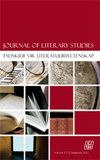罪责与自然——坦努尔·奥加德《死里逃生:冠状病毒大流行的诗歌日记》选集中的自然违规
IF 0.1
4区 文学
0 LITERARY THEORY & CRITICISM
引用次数: 0
摘要
在文学想象中,人类和非人类主体的违法行为表现在不同的层面和特征上。本研究从病理学角度出发,认为坦努雷·奥加德诗歌中对违反自然法的罪状的表现主要源自人类行为主体的意向性,并与非人类本性的非意向性相交叉。在自然-自然违犯的例子中,人类以人类为中心的第一原因违犯与非人类主体的第二原因违犯相交,从而产生了故意和无意的二元罪责。Tanure Ojaide在《死里逃生:冠状病毒大流行的诗意日记》(2021)中记录了以人类为中心的鲁莽行为和对生态系统的滥用所带来的痛苦主题,这些主题导致了自然-自然的违规行为和随后的罪责。通过尖锐的意象和令人兴奋的流畅性,Ojaide展示了人类病原体和非人类冠状病毒对物理和生物环境造成的严重破坏。这个祷告是通过哀悼和谨慎的语气来表达的。在2019年达到阈值的病理性瘴气中,这些警告表明了希望。之所以选择劳伦斯·布尔的生态批判观点,是因为他认为人类中心主义的疏忽和无知是自然中法律和秩序崩溃的主要原因。因此,在造成大流行、疾病和死亡的过程中,人类中心主义和冠状病毒被证明是罪魁祸首。本文章由计算机程序翻译,如有差异,请以英文原文为准。
Culpability and Nature-Nature Infractions in Select Poems in Tanure Ojaide’s Narrow Escapes: A Poetic Diary of the Coronavirus Pandemic
In literary imaginings, the infraction of the law by human and nonhuman agents manifests in different planes and character. With a pathology-inclined compass, this study argues that the representation of culpability for the infraction of natural law in Tanure Ojaide’s poetry emanates mainly from the intentionality of human agents and intersects with the unintentionality of nonhuman nature. In the instance of nature-nature infractions, a first-cause anthropocentric infraction by humans intersects with a second-cause infraction from the nonhuman agents, thereby creating the binary of intentional and unintentional culpability. Tanure Ojaide, in Narrow Escape: A Poetic Diary of the Coronavirus Pandemic (2021), chronicles the themes of agonies arising from anthropocentric recklessness and abuse of the ecosystem, which result in nature-nature infractions and the subsequent culpability. With poignant imagery and electrifying fluidity, Ojaide presents a litany of the havoc wreaked by human agents and the nonhuman coronavirus on the physical and biological environments. This litany is expressed through tones of lamentation and caution. The cautionary notes evince hope in the midst of the pathological miasma that assumed a threshold in 2019. Lawrence Buell’s eco-critical view is chosen because it locates anthropocentric negligence and ignorance as liable reasons for the breakdown of law and order in nature. Therefore, in causing the pandemic, sickness, and death, anthropocentrism as well as the coronavirus are shown to be culpable of homicide in the selected poems.
求助全文
通过发布文献求助,成功后即可免费获取论文全文。
去求助
来源期刊

Journal of Literary Studies
Multiple-
CiteScore
0.50
自引率
0.00%
发文量
0
期刊介绍:
The Journal of Literary Studies publishes and globally disseminates original and cutting-edge research informed by Literary and Cultural Theory. The Journal is an independent quarterly publication owned and published by the South African Literary Society in partnership with Unisa Press and Taylor & Francis. It is housed and produced in the division Theory of Literature at the University of South Africa and is accredited and subsidised by the South African Department of Higher Education and Training. The aim of the journal is to publish articles and full-length review essays informed by Literary Theory in the General Literary Theory subject area and mostly covering Formalism, New Criticism, Semiotics, Structuralism, Marxism, Poststructuralism, Psychoanalysis, Gender studies, New Historicism, Ecocriticism, Animal Studies, Reception Theory, Comparative Literature, Narrative Theory, Drama Theory, Poetry Theory, and Biography and Autobiography.
 求助内容:
求助内容: 应助结果提醒方式:
应助结果提醒方式:


